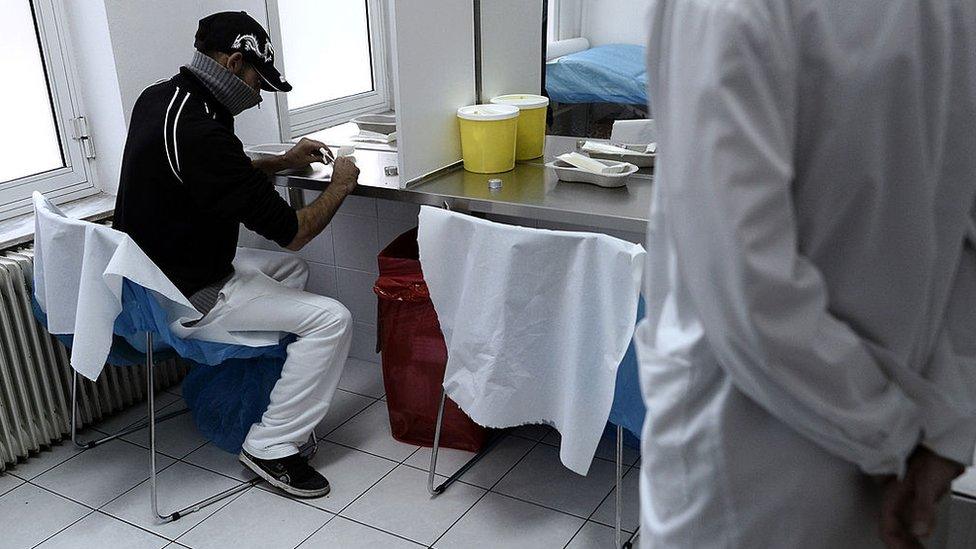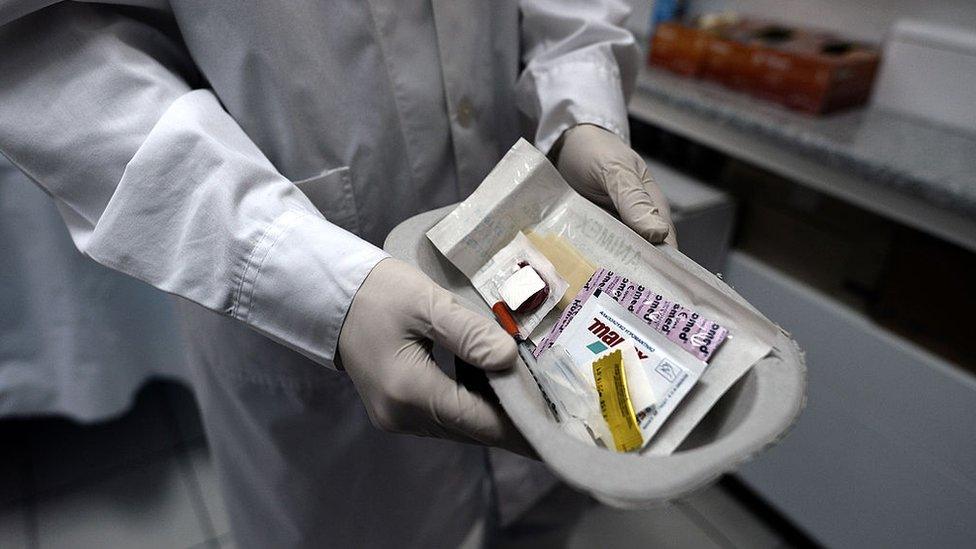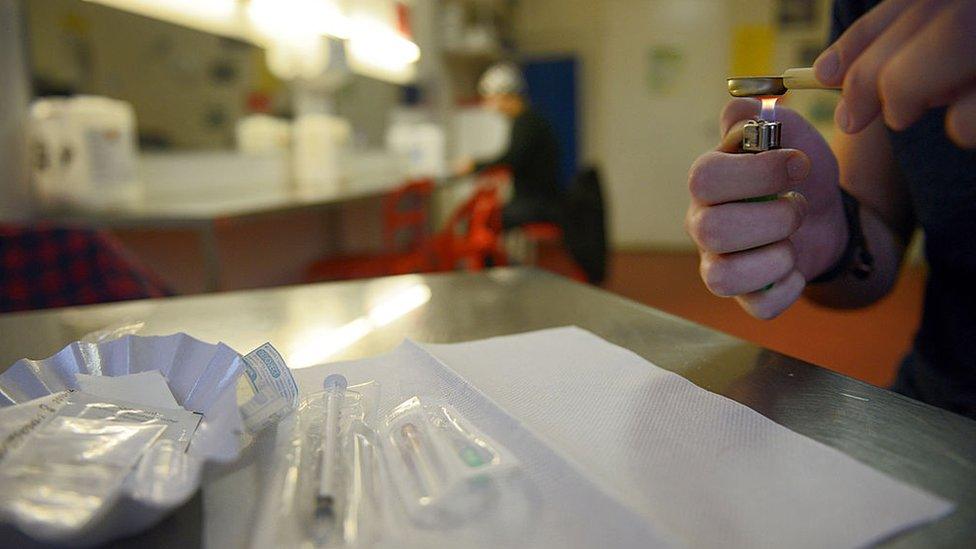Medical experts call for 'safe' drug consumption rooms
- Published

Users can take drugs under supervision at so-called safe consumption rooms
Scotland should introduce "safe consumption rooms" to tackle a record number of drug deaths, senior medical professionals have said.
The Royal College of Physicians of Edinburgh (RCPE) wants the Scottish and UK governments to seriously consider decriminalising drug possession.
More than 1,200 people died of drug misuse in Scotland in 2019.
First Minister Nicola Sturgeon has accepted that her government "should have done more" to address the issue.
She has pledged an extra £250m over the next Holyrood term to tackle the "national disgrace" of drug-related deaths.
An RCPE report - based on submissions by leading experts - highlights an "impasse" between Westminster and Holyrood over drug policy.
Medics said politicians "must avoid using drug-related deaths as a political football".
The report urges politicians to listen to advice provided by frontline medical professionals.
Professor Angela Thomas - who is acting president of the college - co-authored the report, Drug Deaths in Scotland: an increasingly medical problem.

She said: "Our report proposes some key interventions which can be taken now, including the introduction of a drugs consumption room, and a heroin-assisted treatment programme in all major centres in Scotland as we see already at the Glasgow pilot scheme.
"Decriminalising drug use should be considered in Scotland, and the college would urge the UK government and the Scottish government to work collaboratively on this key policy area.
"We believe that drug-related deaths should be fundamentally treated as a public health issue."


The college has added its voice to a number of experts who believe trialling drug consumption rooms would have a positive impact on efforts to drive down overdose deaths in Scotland and the rest of the UK.
The idea is that people using heroin should be given a sheltered space where they are supervised by medics, given clean equipment and able to access services such as housing and social work.
However, while the Scottish government is open to the plans, it says it must be established legally. The problem is, the UK government does not support such an idea, and it controls national drug policy.
That impasse has led to direct action. In Glasgow, one man has been operating a drug consumption van for nearly six months. He has no legal framework and was told at the outset that his actions may be unlawful but, so far, he hasn't been prosecuted.
Scotland is in the process of addressing issues around inflexible addiction services that might have a bigger impact on more drug users.
However, for many, safe consumption rooms remain emblematic of the idea of a "public health approach" to the drugs death crisis.

The report recommends urgent research "to examine the links between poverty and drug-related deaths, including the impact of Covid-19 on drug use".
It also supports work already being carried out by the Scottish government's Drug Death Taskforce.
Prof Thomas said: "Heroin continues to be a major cause of drug-related deaths in Scotland, so it is clear that intervention is required to tackle this and we welcome the pilot scheme in Glasgow."
'Good work'
"Our aim is to support the good work of the Drug Deaths Taskforce, put forward helpful suggestions based on our clinical expertise, encourage debate, and support medical education on this critical issue."
Scotland recorded its highest ever drug death total of 1,264 in 2019 - a record number for the sixth year running.
It was a death rate three times higher than that of the UK as a whole and a 6% rise on the previous year.
It led to the departure of Public Health Minister Joe FitzPatrick, and the appointment of Angela Constance as the Scottish government's new Minister for Drug Policy.

Heroin use is a major cause of drug-related deaths in Scotland
In January, First Minister Nicola Sturgeon announced £250m in extra funding over five years to tackle the rising number of fatalities.
This included more cash for rehab services as well as the expansion of heroin-assisted treatment - which sees heroin users prescribed the drug on the NHS and given swifter access to services - from a pilot scheme in Glasgow across the country.
However, Ms Sturgeon added that her government was still exploring "legal barriers" which she said prevented the operation of a legal consumption room, where people can inject street drugs under supervision.
The Scottish government has previously expressed support for the scheme, although the Misuse of Drugs Act is reserved to the UK government, which does not support the move.
Harm reduction
Scotland's Drugs Policy Minister Angela Constance said she looked forward to working with the RCPE "as we take forward heroin-assisted treatment and other work on harm reduction".
She added that the government "will look at any approaches that have a strong evidence base that may be able to help save lives".
The UK government's minister for crime and policing, Kit Malthouse, said it was committed to working with the Scottish government to tackle drug misuse, but it had "no plans to decriminalise drug possession".
He added: "It would not eliminate the crime committed as a result of the illicit trade, nor would it address the harms associated with drug dependence and the misery that this can cause to families and communities."